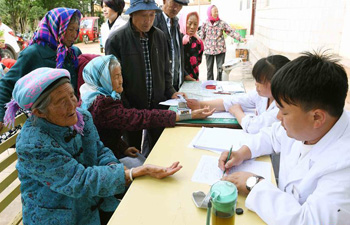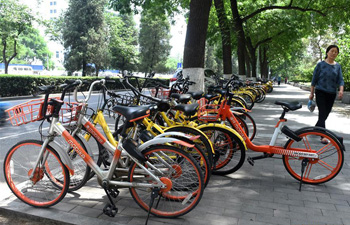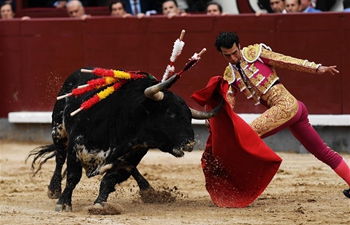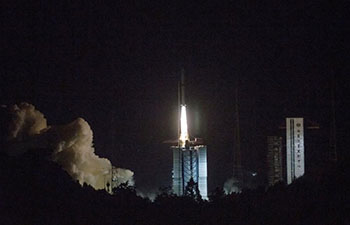
Huang Jiefu (3rd R), head of the China National Organ Donation and Transplantation Committee and chairman of the China Organ Transplantation Development Foundation, speaks during a press conference in Geneva, Switzerland, on May 25, 2018. Experts introduced China's reform and achievements in organ donation and transplantation to international peers, delegations and media here Thursday, and refuted allegations of living organ collecting in the country. (Xinhua/Alain Grosclaude)
GENEVA, May 25 (Xinhua) -- Experts introduced China's reform and achievements in organ donation and transplantation to international peers, delegations and media here Thursday, and refuted allegations of living organ collecting in the country.
Huang Jiefu, head of the China National Organ Donation and Transplantation Committee and chairman of the China Organ Transplantation Development Foundation, said at a press conference that China's reform and achievements in this regard are illustrative of the World Health Organization (WHO's) guiding principles of equity, transparency and fairness.
"China's model of organ donation and transplantation features strong government support for the legal, administrative and health sectors, and progress of the capacity building of organ transplantation clinical service and technical development," he told a press conference sponsored by the Chinese Mission to the United Nations at Geneva.
China's State Council promulgated the Regulations on Human Organ Transplantation in 2007 and the National People's Congress promulgated the Eighth Amendment to the Criminal Law in 2011, which includes articles relevant to organ transplantation.
Huang said the above regulations and laws pave the way to serve as the legal foundation to stem all organ-related crimes in China.
What's more, Huang said China has also established a single mandatory national organ allocation computer system, which is interconnected with four transplant registries to ensure the traceability and fairness of organ distribution.
In 2015, a reform was accomplished in China prohibiting the use of organs from executed prisoners, and China has also prohibited foreign patients from undergoing organ transplantations in the country.
The Chinese government has authorized transplant hospitals by a licensing policy, and is now implementing a national anti-organ trafficking surveillance system.
"This big data system may serve as an example of an operational mechanism to combat organ trafficking for the rest of the world, empowered by information integration between health and legal authorities," Huang said.
The expert told reporters that China proposed last year to the World Health Assembly the development of a WHO task force to work with governments to better push forward the global governance of transplants, and the proposal is currently moving ahead smoothly.
"These developments in China represent a new era of organ donation and transplantation," he said.
In response to the rumors by some Western media that "China has a yearly organ transplantation volume of up to 60,000 to 100,000" and "organ harvesting from Falun Gong practitioners," experts attending Thursday's press conference said the rumors are not grounded in fact.
A figure given by Huang showed that from January 2010 to April 2018, 17,085 Chinese civilians volunteered to have their organs donated after their death, and over 48,000 solid organs were transplanted in China as well.
Zheng Zhe, an expert from Beijing Fuwai Hospital, said at the press conference that as an organ transplant doctor, he personally participated in and witnessed the changes regarding organ transplantation in China, and was proud of them.
In 2017, he said, China handled 5,146 organ donation cases after the death of the donors and 16,000 organ transplantations, so the rumor about60,000 to 100,000 annual organ transplantations in China was totally groundless.
Wang Haibo, an expert from the China National Organ Donation and Transplantation Committee, said that organ trafficking is a serious crime in China. Wang said that from 2007 to 2017, some 220 criminal suspects were captured and over 100 people were brought to justice.















